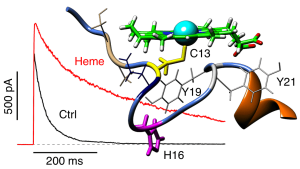Heme is a potent regulator of potassium channel inactivation
Kv1 4 current traces without (black) and with hemin (red). Part of the N-terminal ball domain with a docked hemin moiety.
Illustration: FSU BiophysikHeme, traditionally viewed as a stable protein cofactor such as in hemoglobin, also serves as an acute signaling molecule and is cytotoxic at high concentrations. Here, we show that free intracellular heme potently enhances A-type potassium channel function. Such channels determine action potential frequency in excitable cells and their dysfunction often contributes to pathological hyperexcitability, such as in pain and epilepsy. Binding of free heme at nM concentrations to the “ball-and-chain” N terminus of A-type potassium channels, which typically closes the channels, introduces a stable structure in the otherwise disordered region and allows for a greater efflux of potassium ions, thus reducing cellular excitability. Heme therefore could be a powerful negative-feedback regulator in brain and muscle function.
